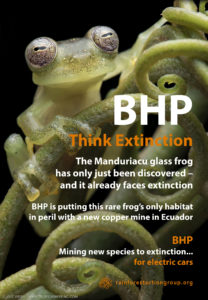A closed-door meeting held to recruit employees from the Cazarpamba community in Imbabura ended unexpectedly for BHP representatives who fled in embarrassment after community members decried the company’s presence in a region which overwhelmingly voted to reject mining at a parish assembly on the 23rd November.
It is alleged that BHP representatives only invited members of the Cazarpamba community they believed to be sympathetic to mining to the meeting held on December 10. The company had planned to present their exploration plans for the area, but suddenly abandoned the meeting without presenting anything when representatives from environmental group DECOIN and local Parish government members arrived.
A video (in Spanish) shows BHP representatives being upbraided for their secrecy by community representatives, who asked the company "What are you afraid of?" "What are you hiding?".
“Community members questioned the legality of BHP’s actions, not only in this socialisation attempt, but in their continued efforts to explore in the Santa Teresa concessions despite community rejection of mining in the region,” says Mr Anthony Amis, a member of the Rainforest Action Group.
“Given the Constitutional requirement that BHP must consult with communities before undergoing explorations, the decision for BHP representatives to leave the meeting was fatal, with those present at the meeting believing their hasty retreat meant they were indeed acting illegally in the region,” Mr Anthony Amis says.
The environmental license for initial exploration for the Santa Teresa and Santa Teresa 2 concessions was given to BHP 23 months ago, yet the company has been stymied in its exploration efforts due to the community’s strong anti-mining stance. The recent developments follow on from BHP’s announcement of a $22 million increase in their stake in SolGold on 24 November.
“The meeting at Cazarpamba was not BHP's first attempt at conducting business by excluding community members who are anti-mining. In October this year, residents of a nearby Intag community, Puranquí, filed a complaint that BHP had set up a meeting without knowledge of the community Mayor or Council, who are predominantly anti-mining, and had held the meeting in secret with members of two pro-mining families,” Mr Anthony Amis says.
After BHP employees left the Cazarpamba meeting, DECOIN and local Parish government members talked about the illegalities and risks associated with the project and BHP’s negative conduct in the region, which allegedly includes intimidation to people opposing mining, and conducting mining activities in protected and environmentally fragile areas.
Despite BHP’s stated commitment to biodiversity conservation, there are 4,200 hectares of community and Parish government-owned watershed reserves within the 9,246 hectares that make up the two Santa Teresa concessions.

“The company is insisting on starting exploration in the region despite an unusually high number of animals on the IUCN Red List within the Santa Teresa concession, including the critically endangered Black-breasted Puffleg Hummingbird, the rare Black and Chestnut Eagle, and an extremely rare frog species on the brink of extinction which is only found in the area of one of these concessions,” says Mr Carlos Zorilla, environmentalist and co-founder of DECOIN.1
Members of the Rainforest Action Group earlier raised concerns regarding BHP’s selective community socialisation and complaints of their conduct at BHP’s AGM on 7 November. BHP Chairman Ken MacKenzie had this to say in response: “We are talking to communities and can assure you that we are following FPIC (free, prior and informed consent) and all local laws; we have strict standards for consultation and our conduct when entering new areas."
In June, judges in the provincial court of Imbabura shut down exploratory activities in two mining concessions belonging to the Canadian Cornerstone, just west of BHP’s Sabeleta concessions and within the same Cotacachi County. The court ruled that ENAMI/Cornerstone had broken Constitutional Law by not consulting with the community in regards to their Rio Magdalena concessions, and their environmental license to conduct explorations was revoked.
“The Magdalena concessions for which environmental licenses were revoked border on BHP’s Sabeleta concessions. The concessions cover part of a world-renowned remnant of the original Western Andes cloud forest, which contains species that exist nowhere else in the world, and provides drinking water for hundreds of communities,” says Mr Anthony Amis.
“Although BHP has not yet been taken to court for activities on the Sabeleta concessions, locals claim that BHP has similarly not consulted with community and employees have wreaked damage in its exploration efforts, including threatening an endemic frog population which is only found in the concession," says Mr Anthony Amis.
“Despite BHP’s attempts to smooth-talk shareholders and promote itself as a green company, the reality on the ground is very different. We are concerned that the company is minimising possible risks to the project,” says Mr Anthony Amis.
“BHP, as well as all other mining companies in Intag, are keeping from investors obstacles such as the land-use municipal ordinance approved in 2018, which protects all of the Intag area from mining. Ecuador's Constitution unequivocally gives sole responsibility to local governments for land use,” says Mr Carlos Zorilla.2
Community consultation is safeguarded under the Constitution and several cases have been won this year by communities against mining and oil companies on those counts.
“It is clear to the Rainforest Action Group that BHP is acting at odds to Ecuadorian Constitutional Law, and is keeping investors in the dark as to the ecology on the concession. Shareholders deserve to know the extent of BHP’s conduct on its concessions,” says Mr Anthony Amis.
1. From internal email. Permission to use quote.
2. From internal email. Permission to use quote.
CONTACT INFORMATION AND FULL MEDIA RELEASE HERE.